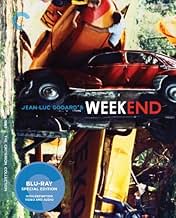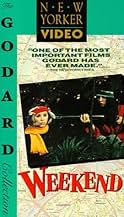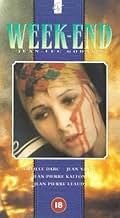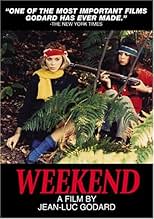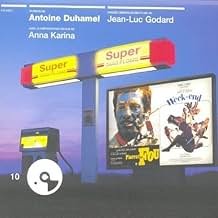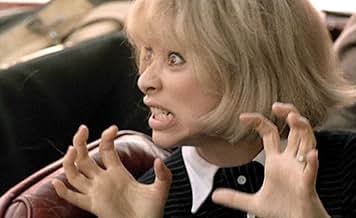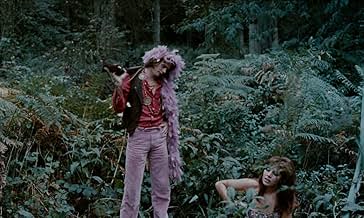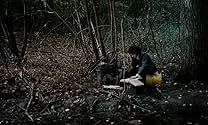NOTE IMDb
6,9/10
16 k
MA NOTE
Une histoire surréaliste d'un couple marié prenant la route afin de rendre visite aux parents de la femme et de les tuer pour l'héritage.Une histoire surréaliste d'un couple marié prenant la route afin de rendre visite aux parents de la femme et de les tuer pour l'héritage.Une histoire surréaliste d'un couple marié prenant la route afin de rendre visite aux parents de la femme et de les tuer pour l'héritage.
- Réalisation
- Scénario
- Casting principal
- Récompenses
- 1 victoire et 4 nominations au total
Yves Afonso
- Gros Poucet
- (non crédité)
Yves Beneyton
- Un membre du FLSO
- (non crédité)
Juliet Berto
- Une activiste du FLSO
- (non crédité)
- …
Michèle Breton
- Girl in the woods
- (non crédité)
Michel Cournot
- Man From Farmyard
- (non crédité)
Lex De Bruijn
- Revolutionary
- (non crédité)
Jean Eustache
- L'auto-stoppeur
- (non crédité)
Jean-Claude Guilbert
- Le clochard
- (non crédité)
Paul Gégauff
- Le pianiste
- (non crédité)
Blandine Jeanson
- Emily Bronte
- (non crédité)
Louis Jojot
- Monsieur Jojot
- (non crédité)
Valérie Lagrange
- La femme du chef du FLSO
- (non crédité)
Jean-Pierre Léaud
- Saint-Just
- (non crédité)
- …
Ernest Menzer
- Ernest - le cuisinier
- (non crédité)
- …
Sanvi Panou
- Mon frère africain
- (non crédité)
Avis à la une
'Week End' is a poor attempt to mix highbrow political attacks with a lowbrow sensibility from one of cinema's great artists. Here we have Jean-Luc Godard at both his most political, and his most experimental, throwing together ideas about Marxism, cannibalism and consumerism, and not caring one little bit whether or not the audience understands his angle of attack, or even his reason for it. Beginning the film with juvenile captions like "a film adrift in the cosmos" and "a film found on a dump", 'Week End' desperately tries to set up a nonchalant attitude to politics, society and the role of the filmmaker, but instead, simply smacks of pretension.
Godard's early movies demonstrated both a love and understanding for the medium for which he both embraced and reinvented, at the same time producing a number of classic films. However, sometime during the mid-sixties Godard became less interested in linear storytelling, and more concerned with empty provocation, which is illustrated clearly in 'Week End'. The disjointed, often rambling 'plot' follows a young Parisian couple, Roland and Corrine. Both at the height of the swinging-sixties revolution -- they openly have affairs, and delight in telling each other about their seedy escapades in sordid detail. When sex isn't motivating them, money is, or at least the prospect of money. So much so, when the chance arrives to visit Corrine's dying father, they plot to finish the old man off, and then reap the benefits of the inheritance. An odious act you might say, but up until this point the film has been quite interesting, almost enjoyable, showing us a very witty deconstruction of our preconceptions of the modern Parisian couple. But as the pair hit the road, Godard takes his message and proceeds to whack the viewer square in the face with it.
Beginning with the in/famous ten-minute tracking shot (following Roland and Corrine as the try desperately to negotiate a traffic jam on a county road), their journey takes them on an episodic odyssey that is supposed to represent a symbolic cleansing for the characters. As the film progresses they witness bizarre fairytale people who preach liberalistic nonsense, all manner of unexplained car crashes, raving lunatics and a band of terrorists. All this is supposed to strip away Roland and Corrine's bourgeois façade, making them pure human beings again. The message is blunt, unsubtle and heavy-handed, without the mindless consumerism of modern society, man and woman can function purely, as they where meant to. But despite Godard's self-confidence, it is unclear from the film where his own political allegiance lies. It would seem he feels strongly in favour of anti-commercialism/anti-consumerism, but his argument is fatuous -- and lacking sufficient and believable ammunition to back it up -- his only alternative to everyday modern life would seem to be joining a band of cannibalistic terrorists. Or maybe this was a metaphor for society's often-violent ways.
On a plus side, 'Week End' sees Godard at his most primitive, both stylistically and visually. He composes each frame with the brightest of colours, has his actors speaking monologues directly to camera, and then the aforementioned, long, unbroken tracking shots. Of course despite having an interesting quality, these stylistic flairs mean absolutely nothing. It's merely Godard's attempt to make the audience pay attention to what the characters are saying -- but since they are all speaking pure drivel it would seem to have been a bad move. By the time the film reaches its inevitable, ambiguous climax, the whole event becomes all the more tiresome. As Godard runs out of things to say (which is long after the film ceased to make sense of its ideas), he begins building up images of collective degradation and supposed black-comedy satire, neither of which work successfully... and I haven't even mentioned the acting yet.
The only decent performance you'll find that is even remotely worth watching (i.e. not entirely detestable a characterisation), is Jean-Pierre Léaud's double cameo as 'saint-just'/'singing man in phone box'. He is an extremely likable actor, familiar to audiences as the young Truffaut-alike in 'The 400 Blows'. Unlike the other cast members (with the exception of Mireille Darc as Corrine), he is clearly in sync with Godard's particular filmmaking style, and for a brief moment, makes the film almost enjoyable. I feel bad criticising Godard like this, he is a rare filmmaker, and one who has never been afraid to speak his ideas courageously -- demonstrated by the list of relevant issues here -- but they are just not communicated well enough. It's a great shame then that Godard had to make his film so heavy-handed in its ideals, and so excruciatingly slow in pace that it fails to work on any real, important level. A huge disappointment 2/5
Godard's early movies demonstrated both a love and understanding for the medium for which he both embraced and reinvented, at the same time producing a number of classic films. However, sometime during the mid-sixties Godard became less interested in linear storytelling, and more concerned with empty provocation, which is illustrated clearly in 'Week End'. The disjointed, often rambling 'plot' follows a young Parisian couple, Roland and Corrine. Both at the height of the swinging-sixties revolution -- they openly have affairs, and delight in telling each other about their seedy escapades in sordid detail. When sex isn't motivating them, money is, or at least the prospect of money. So much so, when the chance arrives to visit Corrine's dying father, they plot to finish the old man off, and then reap the benefits of the inheritance. An odious act you might say, but up until this point the film has been quite interesting, almost enjoyable, showing us a very witty deconstruction of our preconceptions of the modern Parisian couple. But as the pair hit the road, Godard takes his message and proceeds to whack the viewer square in the face with it.
Beginning with the in/famous ten-minute tracking shot (following Roland and Corrine as the try desperately to negotiate a traffic jam on a county road), their journey takes them on an episodic odyssey that is supposed to represent a symbolic cleansing for the characters. As the film progresses they witness bizarre fairytale people who preach liberalistic nonsense, all manner of unexplained car crashes, raving lunatics and a band of terrorists. All this is supposed to strip away Roland and Corrine's bourgeois façade, making them pure human beings again. The message is blunt, unsubtle and heavy-handed, without the mindless consumerism of modern society, man and woman can function purely, as they where meant to. But despite Godard's self-confidence, it is unclear from the film where his own political allegiance lies. It would seem he feels strongly in favour of anti-commercialism/anti-consumerism, but his argument is fatuous -- and lacking sufficient and believable ammunition to back it up -- his only alternative to everyday modern life would seem to be joining a band of cannibalistic terrorists. Or maybe this was a metaphor for society's often-violent ways.
On a plus side, 'Week End' sees Godard at his most primitive, both stylistically and visually. He composes each frame with the brightest of colours, has his actors speaking monologues directly to camera, and then the aforementioned, long, unbroken tracking shots. Of course despite having an interesting quality, these stylistic flairs mean absolutely nothing. It's merely Godard's attempt to make the audience pay attention to what the characters are saying -- but since they are all speaking pure drivel it would seem to have been a bad move. By the time the film reaches its inevitable, ambiguous climax, the whole event becomes all the more tiresome. As Godard runs out of things to say (which is long after the film ceased to make sense of its ideas), he begins building up images of collective degradation and supposed black-comedy satire, neither of which work successfully... and I haven't even mentioned the acting yet.
The only decent performance you'll find that is even remotely worth watching (i.e. not entirely detestable a characterisation), is Jean-Pierre Léaud's double cameo as 'saint-just'/'singing man in phone box'. He is an extremely likable actor, familiar to audiences as the young Truffaut-alike in 'The 400 Blows'. Unlike the other cast members (with the exception of Mireille Darc as Corrine), he is clearly in sync with Godard's particular filmmaking style, and for a brief moment, makes the film almost enjoyable. I feel bad criticising Godard like this, he is a rare filmmaker, and one who has never been afraid to speak his ideas courageously -- demonstrated by the list of relevant issues here -- but they are just not communicated well enough. It's a great shame then that Godard had to make his film so heavy-handed in its ideals, and so excruciatingly slow in pace that it fails to work on any real, important level. A huge disappointment 2/5
Wow, such a polarizing film! It seems everyone either detests this work as something less than terrible or conversely praise it to the heavens. I guess I'm sadly somewhere in between. Having read a bit of theory behind the film before I saw it I won't rehash that here, only state my reaction, for if there's anything this picture cries out for it is a reaction. Well here goes. Parts are horrifying. Far more disturbing than slasher film gore (mostly because the imagery being dispensed with aren't human). Parts are boring (and NOT the ten minute tracking shot which was a gem. Has anyone even been in a traffic jam before? Godard merely replicates it and all the while makes you wonder where that couple's car is heading, and what could have caused such a jam). Parts don't make sense, mostly because I don't think they are supposed to. That is their purpose, to disrupt sense. And, surprisingly something that nobody on here has mentioned, parts are very very funny. Okay, so perhaps not everyone will laugh as often as I did, but please, lighten up kids, Godard is making fun of us, its healthy to laugh at oneself once and a while. And some of his film is just fun too. Okay, now go back to the other reviews of how hopelessly miserable you'll feel after watching this, or how much of a religious awakening this will be if your down with the art-house film-erati. Definitely worth seeing.
There are enough interesting devices employed in Week-end to make one regret its fatal flaws. The ten minute long tracking shot of the traffic jam near the film's beginning, which has elicited so much press, is indeed riveting. There are other moments of brilliance, such as the long circular pan at the piano recital. But the problems with Week-end eventually overpower these moments and one is left wondering why the film and its creator have such a reputation for greatness. Ultimately, Godard's quite valid points about the complacency of the bourgeoisie, the brutality of human nature and the false promises of philosophy, religion and art are undermined by his heavy-handedness. Did Godard really believe that it was necessary to give us scene after scene of people acting in the same craven way to make us understand? Did we really need the 15 minute-long revolutionary speech by the garbage collectors to be able to see his point? Even the implied cannibalism in the final scene is rendered impotent, as just a few minutes earlier, we are forced to watch the very real (and sickening) killing and butchery of a pig. This film, edited mercilessly, would have made a fascinating 45-minute short, and would've produced much more impact upon the viewer. Instead, we are left with this rambling, repetitious exercise in excess. If you intend to see Week-end, I recommend keeping a finger poised over your fast-forward button.
Jean-Luc Godard will always be Jean-Luc Godard. Either you love his films or hate them. Either you love the guy or hate him. Now, with "Weekend" (1967, France), I just don't know what to make of him (not that this is not what I generally feel whenever I see one of his films).
At the film's opening credits, it's outrightly declared that it's "a film adrift in cosmos". Godard must've meant that seriously, for once you've entered the film's universe, you're in for one wreck of a viewing experience. This is one chaotic universe--and I meant to say it in a pleasurable way!
To attempt to state the plot of the film could only be a disservice to it--though this is not to say that the film doesn't have a "plot"! To attempt to extract the essence of the film might only be a disgrace to it--though this is not to say that the film doesn't have an "essence"! To attempt to map out Godard's agenda in making the film could just turn out to be a mockery of the filmmaker--though this is not to say that the film doesn't have an "agenda"!
The plot? A couple goes on a weekend trip to their parents' house to execute a sinister plan....The essence? The decadence of bourgeois values, the arbitrary yet natural progression of fate, and the transformative power of social awakening....The agenda? For Godard to become increasingly political and to continue on deconstructing the traditional film narrative methods, and thus "alienating" the film audience.... (Much like, theater-wise, Bertolt Brecht had increasingly become political in his succeeding plays while at the same time had continued on employing "alienating" theatrical devices.)
But all of these takes a side-step to give way to the overwhelming chaos, arbitrariness and "playful" senselessness that truly characterize "Weekend". Or, perhaps, the "means" are designed to be of service to the "end".
This chaotic cosmos is potently embedded in the viewers' sensibilities by way of that jaw-droppingly sustained 10-minute dolly shot of a horrendous countryside traffic jam (the "mother of all traffic jams", as one film reviewer ably put it) that the above-quoted couple encountered on their way to Oinville (their parents' place). After that, the quirky and amoral couple would continue to meet along the way a whole lot of "hindrances" to their destination, most of which Godard leisurely takes his time to stage (as what he did, say, in "Alphaville" and "Band of Outsiders").
On the one hand, these "hindrances" appear to be a carry-over from the previous traffic jam that the couple went through (those car wrecks and corpses). On the other hand, they are intended to be an overt display of the filmmaker's alienating techniques (like at one point where the couple gets to encounter a pair of "fictional", "literary" characters and the man starts to blurt out how "trashy" the film is for all they meet are "crazy characters"--how hilarious!). On the other still, they serve as a venue for Godard's explicit political views, the expressiveness is of such a way that this may take the form of direct camera address (like in that long scene where these two "brothers" pour out their thoughts and sentiments about the oppression in South Africa and the discrimination of the blacks).
Now that I have mentioned things political, I'm not sure if it's even necessary to mention the political "awakening" that came upon the woman after the couple was kidnapped by a band of Communist guerrillas. The scenes comprising this specific episode tread the line of being absurd, grotesque and outrageous that seeing them can't even make one believe them.
The online Premiere magazine listed "Weekend" as one of the "25 Most Dangerous Movies". "Dangerous" in the sense of these films challenge our "bedrock notions" of what it is that we normally see in the movies and how we see them (with films like "A Clockwork Orange", "Eraserhead", "Requiem for a Dream", "Freaks"). It's a question of theme and method. Well, it's not that JLG's films have not always turned our viewing experience upside down. But when compared to, let's say, the ebullient fatalism of "Breathless", "Weekend" in fact exudes an apocalyptic melange and an irresolvable recklessness that make it rather an uncomfy fare.
The irony is that even if this Godard film is labeled as "dangerous", it's still worth a repeat viewing, much like all the other films that made it to the Premiere mag's list. It's one thing to say that this film poses danger and it's another to say that this film is "painful to watch twice". It's something that's worthy of another article--and actually there's an available list for that already!
At the film's opening credits, it's outrightly declared that it's "a film adrift in cosmos". Godard must've meant that seriously, for once you've entered the film's universe, you're in for one wreck of a viewing experience. This is one chaotic universe--and I meant to say it in a pleasurable way!
To attempt to state the plot of the film could only be a disservice to it--though this is not to say that the film doesn't have a "plot"! To attempt to extract the essence of the film might only be a disgrace to it--though this is not to say that the film doesn't have an "essence"! To attempt to map out Godard's agenda in making the film could just turn out to be a mockery of the filmmaker--though this is not to say that the film doesn't have an "agenda"!
The plot? A couple goes on a weekend trip to their parents' house to execute a sinister plan....The essence? The decadence of bourgeois values, the arbitrary yet natural progression of fate, and the transformative power of social awakening....The agenda? For Godard to become increasingly political and to continue on deconstructing the traditional film narrative methods, and thus "alienating" the film audience.... (Much like, theater-wise, Bertolt Brecht had increasingly become political in his succeeding plays while at the same time had continued on employing "alienating" theatrical devices.)
But all of these takes a side-step to give way to the overwhelming chaos, arbitrariness and "playful" senselessness that truly characterize "Weekend". Or, perhaps, the "means" are designed to be of service to the "end".
This chaotic cosmos is potently embedded in the viewers' sensibilities by way of that jaw-droppingly sustained 10-minute dolly shot of a horrendous countryside traffic jam (the "mother of all traffic jams", as one film reviewer ably put it) that the above-quoted couple encountered on their way to Oinville (their parents' place). After that, the quirky and amoral couple would continue to meet along the way a whole lot of "hindrances" to their destination, most of which Godard leisurely takes his time to stage (as what he did, say, in "Alphaville" and "Band of Outsiders").
On the one hand, these "hindrances" appear to be a carry-over from the previous traffic jam that the couple went through (those car wrecks and corpses). On the other hand, they are intended to be an overt display of the filmmaker's alienating techniques (like at one point where the couple gets to encounter a pair of "fictional", "literary" characters and the man starts to blurt out how "trashy" the film is for all they meet are "crazy characters"--how hilarious!). On the other still, they serve as a venue for Godard's explicit political views, the expressiveness is of such a way that this may take the form of direct camera address (like in that long scene where these two "brothers" pour out their thoughts and sentiments about the oppression in South Africa and the discrimination of the blacks).
Now that I have mentioned things political, I'm not sure if it's even necessary to mention the political "awakening" that came upon the woman after the couple was kidnapped by a band of Communist guerrillas. The scenes comprising this specific episode tread the line of being absurd, grotesque and outrageous that seeing them can't even make one believe them.
The online Premiere magazine listed "Weekend" as one of the "25 Most Dangerous Movies". "Dangerous" in the sense of these films challenge our "bedrock notions" of what it is that we normally see in the movies and how we see them (with films like "A Clockwork Orange", "Eraserhead", "Requiem for a Dream", "Freaks"). It's a question of theme and method. Well, it's not that JLG's films have not always turned our viewing experience upside down. But when compared to, let's say, the ebullient fatalism of "Breathless", "Weekend" in fact exudes an apocalyptic melange and an irresolvable recklessness that make it rather an uncomfy fare.
The irony is that even if this Godard film is labeled as "dangerous", it's still worth a repeat viewing, much like all the other films that made it to the Premiere mag's list. It's one thing to say that this film poses danger and it's another to say that this film is "painful to watch twice". It's something that's worthy of another article--and actually there's an available list for that already!
10miloc
I gave this movie a 10 out of 10. I expect many people would feel hard-pressed to give it a 2 on the same scale, and I honestly wouldn't blame those who do. "Week End" is a machine built to provoke, and perhaps irritation as well as admiration can be a measure of such a machine's success.
For myself, I love it. It boils with anger, frustration, and insane energy. In one sense, it approaches film like the Cubists approached painting, breaking down images, ideas, characters and plot into startlingly photographed, almost geometric segments. But where the Cubists were to content to experiment with form Godard's instincts stay furiously political; it's as though an early Picasso had been commandeered and refitted by George Grosz.
Arrogance is not always a drawback, as rock and roll fans know-- and "Week End" is a terribly arrogant film. The director trashes every convention that he can think of. It's all thrown together-- music, dialogue, on-screen text, unvarnished political theory, frightening violence-- onto a bare hook of a plot: a young, apparently soulless couple go on a week-end trip in the middle of what appears to be the end of Western civilization. Without apologies Godard throws this mess on the table and asks the rest of us, "What have you got to match it?"
Sadly, not much. Cinema as an art has regressed rather than advanced since this film was released. (Godard himself stalled after "Week End.") Despite the rise of independently funded, non-Hollywood films in the past decade, no one seems ready to dare the sort of experimentation with what film could be that was begun in the 60s, and this is a sad thing. The films made by Godard at the height of his powers are all the more precious now. "Week End" is a document of a time when film mattered. It is an artifact, but it would only be dated if it had been surpassed. It does not rest in peace.
For myself, I love it. It boils with anger, frustration, and insane energy. In one sense, it approaches film like the Cubists approached painting, breaking down images, ideas, characters and plot into startlingly photographed, almost geometric segments. But where the Cubists were to content to experiment with form Godard's instincts stay furiously political; it's as though an early Picasso had been commandeered and refitted by George Grosz.
Arrogance is not always a drawback, as rock and roll fans know-- and "Week End" is a terribly arrogant film. The director trashes every convention that he can think of. It's all thrown together-- music, dialogue, on-screen text, unvarnished political theory, frightening violence-- onto a bare hook of a plot: a young, apparently soulless couple go on a week-end trip in the middle of what appears to be the end of Western civilization. Without apologies Godard throws this mess on the table and asks the rest of us, "What have you got to match it?"
Sadly, not much. Cinema as an art has regressed rather than advanced since this film was released. (Godard himself stalled after "Week End.") Despite the rise of independently funded, non-Hollywood films in the past decade, no one seems ready to dare the sort of experimentation with what film could be that was begun in the 60s, and this is a sad thing. The films made by Godard at the height of his powers are all the more precious now. "Week End" is a document of a time when film mattered. It is an artifact, but it would only be dated if it had been surpassed. It does not rest in peace.
Le saviez-vous
- AnecdotesThe tracking shot of the traffic jam was the longest tracking shot in the history of cinema at that point in time as it was 300 meters long.
- Versions alternativesFor the original U.S. theatrical release, distributor Grove Press dubbed the monologues (the garbagemen's piece on black revolution and the hippie's "ocean" poem) into English, although the rest of the film was in the original French with subtitles. A short credits sequence was also appended to the end of the film.
- ConnexionsEdited into Bande-annonce De 'Week End' (1967)
Meilleurs choix
Connectez-vous pour évaluer et suivre la liste de favoris afin de recevoir des recommandations personnalisées
- How long is Weekend?Alimenté par Alexa
Détails
Box-office
- Budget
- 250 000 $US (estimé)
- Durée
- 1h 45min(105 min)
- Mixage
- Rapport de forme
- 1.66 : 1
Contribuer à cette page
Suggérer une modification ou ajouter du contenu manquant

